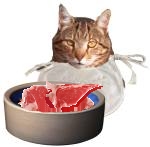Is a raw meat diet good for your cat?

Many pet owners believe that home-prepared food is better for their felines than conventional factory-produced cat food. Among these owners the raw meat diet is becoming not only popular but trendy. After all, the argument goes, cats are pure carnivores; so what could be closer to what their systems are designed for than raw meat? But maybe not. New research suggests that, though full of protein, a raw meat diet may not contain the right amount of nutrients - among other drawbacks.
So say researchers at the University of Illinois at Urbana-Champaign and at Omaha’s Henry Doorly Zoo. They fed a variety of red meats to cats both domestic and wild. Beef trimmings, bison trimmings, elk muscle meat, and horse trimmings were among the smorgasbord of meaty delights which the zoo had to offer. Thereafter the effects of this protein-rich diet were analysed in feline blood serum and fecal samples.
The different meats were also analysed pre-digestion to see how well the feline digestive tracts would cope - particularly how well the proteins would be broken down into amino acids by digestion. Amino acids are the building blocks for new proteins within the cat and an essential part of nutrition. The higher the percentage of conversion of meat proteins into amino acids, the more digestible the meat is.
The results showed that all meats were highly digestible (88% to 89%). So far so good. The raw meat also provided most nutritional needs for the cats - 'most' not being 'all'. Raw meat fell short when it came to fatty acids. None of the meats contained the recommended levels of linoleic acid. Furthermore, horsemeat did not provide the levels of arachidonic acid recommended for kittens, gestating females and lactating females. Quite simply, cats do not get enough fat in a the raw meat diet.
Also important are changes in gut bacteria. In particular, significant differences were detected in the level of Lactobacillus genus (the bacteria responsible for converting lactose and other sugars to lactic acid). Significant differences were also seen in the levels of butyrate and acetate. Butyrates are important as food for cells lining the mammalian colon (colonocytes). Without butyrates for energy, colon cells self-digest and die. Short-chain fatty acids, which include butyrate, are produced by beneficial colonic bacteria (known as probiotics) that feed on, or ferment prebiotics, which are plant products that contain adequate amounts of dietary fiber. These short-chain fatty acids benefit the colonocyte by increasing energy production and cell proliferation. They may also protect against colon cancer.
Another very observable effect of the raw meat diet in felines was the increase in protein fermentation. Feces were more 'odoriferous' because they contained larger amounts of putrefied meat.
Finally the authors of this research warn that feeding raw meat increases the risk of infection with pathogenic bacteria which are killed in the cooking process. But what then, of the fact that cats are 'natural' consumers of raw meat? Well, one argument is simply that without humans providing care and shelter most cats would not live long enough for their dietary deficits to matter. Another is that most raw meat diets - including those used by the researchers - do not contain the meat a cat would obtain for itself in the wild. Few domestic cats are capable of hunting horses, bison or elk, and few humans feed their pets rodent meat, so the 'raw meat' diet is not particularly 'natural'.
The conclusion of the researchers is that if pet owners must feed their pets raw meat, they would do well to supplement this with other nutrients, including appropriate sources of fat and essential fatty acids. They also warn that a high-protein diet can change the types of microbes in the gut as well as introduce undesirable bacteria if the meat is not completely fresh.
Oh, and they might want to consider re-siting the cat litter tray to somewhere the smell won't matter.
Journal Reference:
K. R. Kerr, A. N. Beloshapka, C. L. Morris, C. M. Parsons, S. L. Burke, P. L. Utterback, K. S. Swanson. Evaluation of four raw meat diets using domestic cats, captive exotic felids, and cecectomized roosters. Journal of Animal Science (2012), 91, pp. 225-237
The information supplied here is intended as a guideline only.
